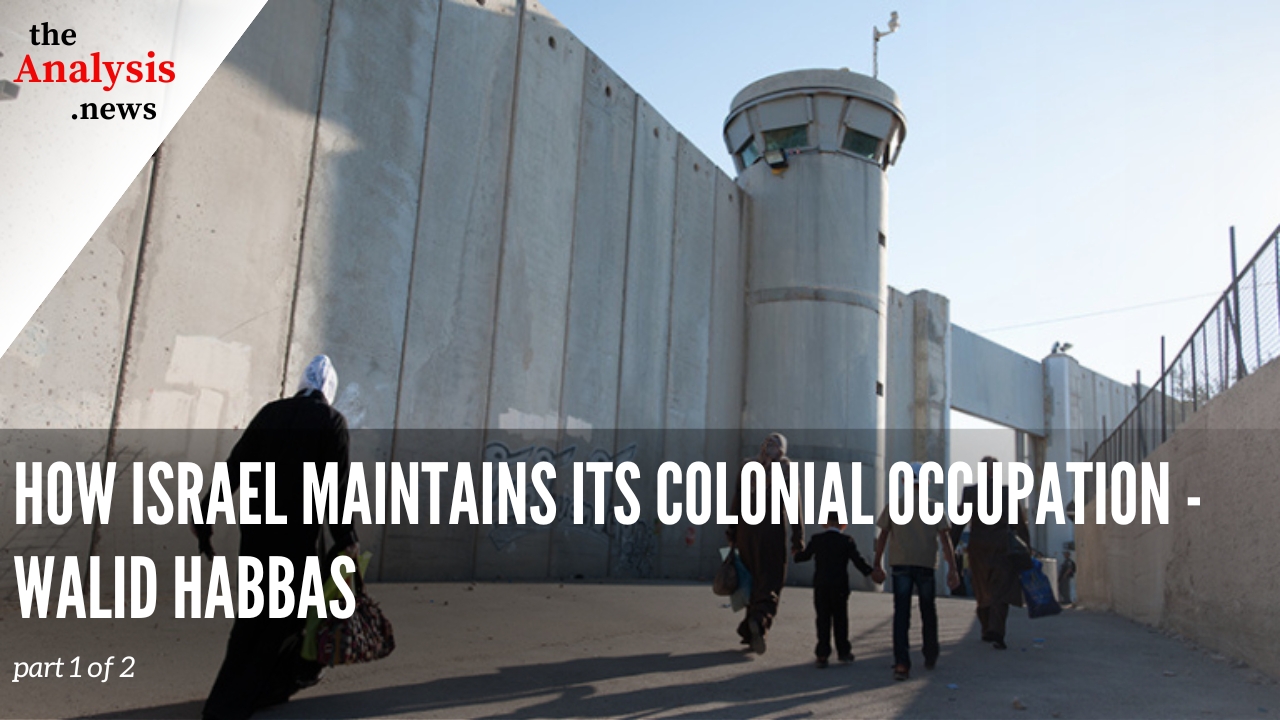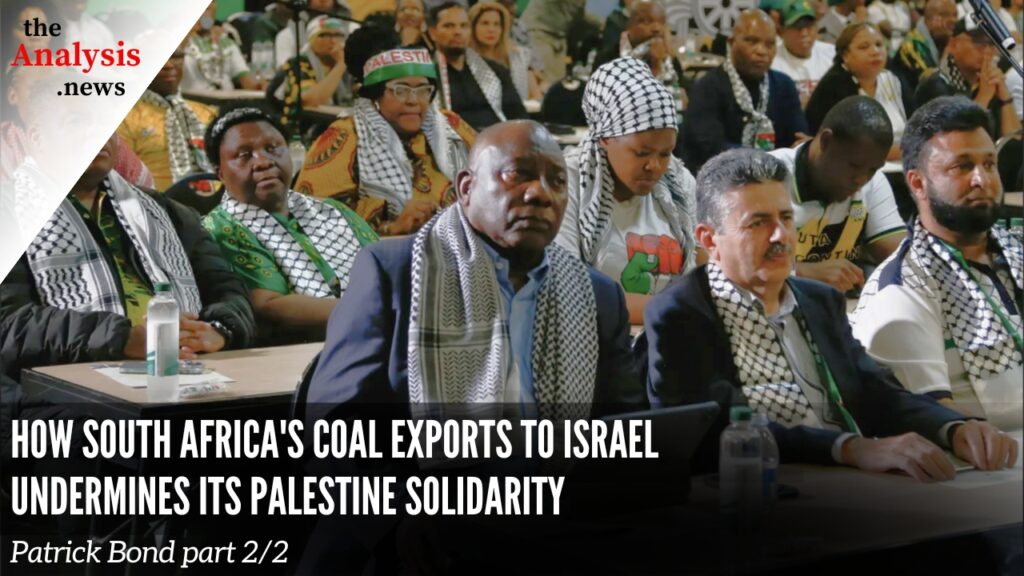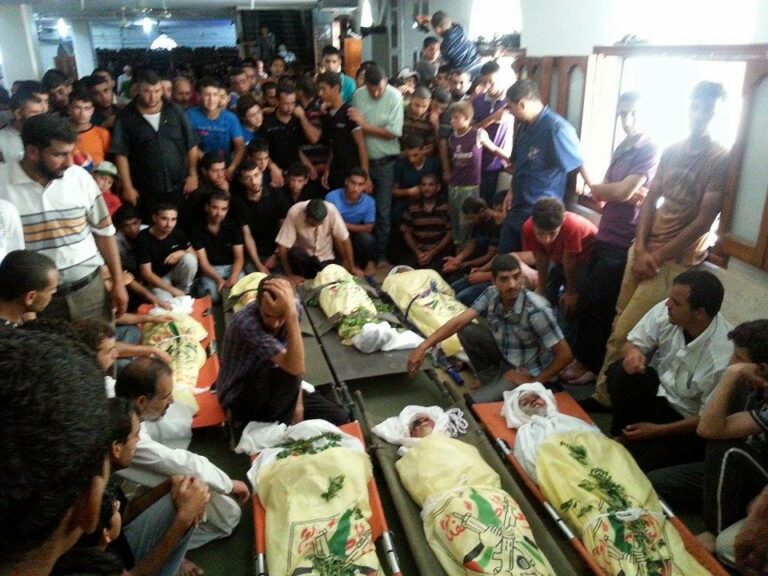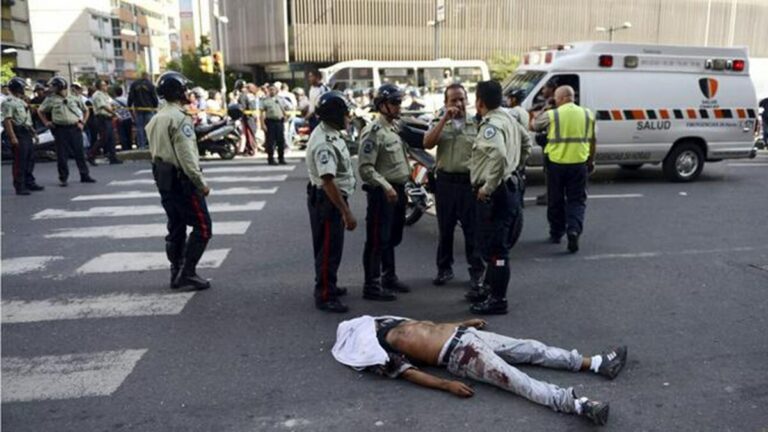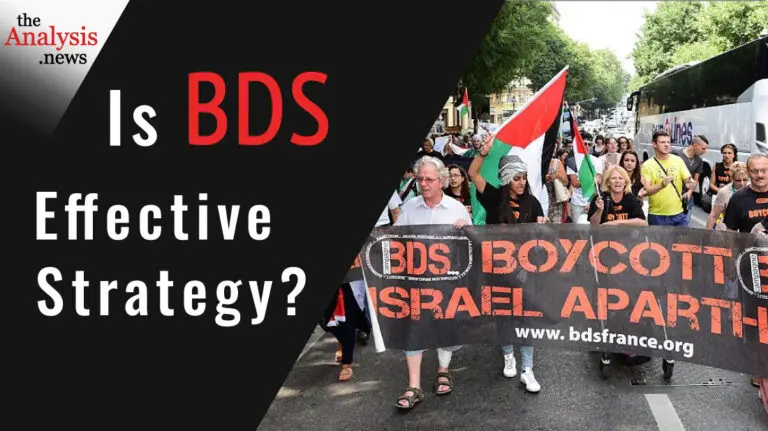Israel has expanded its role as an occupying power in the West Bank, East Jerusalem, and Gaza Strip by building illegal settlements, establishing practices of indirect colonial management founded on military proclamations, and imposing checkpoints and blockades to control the livelihood of Palestinians since 1967 in particular. Walid Habbas, researcher at the Palestinian Forum for Israeli Studies (MADAR), zooms out from the current atrocities and applies a bird’s eye view to flesh out the dynamics of Israel’s occupation of the Palestinian Territories. Besides military deployments enforcing the occupation, Walid delves into Israel’s control of Palestinian industry and the various forms of economic dependency that emerge from it.
How Israel’s Bloodshed in Gaza Follows a Pattern of Demographic Engineering – Walid Habbas part 2/2
Talia Baroncelli
Hi, I’m Talia Baroncelli, and you’re watching theAnalysis.news. You’re watching part one of my discussion with Walid Habbas. In part one, we’ll be discussing Israel’s colonial management of the West Bank, the Gaza Strip, and East Jerusalem and how this particular system emerged.
If you’d like to support us, we’d really appreciate for you to go to our website, theAnalysis.news, and to hit the donate button at the top right corner of the screen. Make sure you get onto our mailing list; that way, you’re always updated every time a new episode drops. Like and subscribe to the show, whether you watch it on YouTube or listen to the show on Apple or Spotify podcast. See you in a bit with Walid.
Joining me now is Walid Habbas. He is a researcher at the Palestinian Forum for Israeli Studies, and he’s also a Ph.D. candidate. He just submitted his Ph.D. thesis at the Hebrew University of Jerusalem, where he’s been studying various economic relations between Israel and the West Bank, as well as the dynamics of oppression and occupation. I’m really excited to have you with me today, Walid.
Walid Habbas
Hi, Talia.
Talia Baroncelli
Why don’t we start off with the bigger picture, as many of our viewers will be aware of what’s going on on the ground? They’ve been following the atrocities that are taking place in Gaza and in the West Bank. But I think it’s really important to contextualize what’s happening and to look at the power dynamics that are currently at play. Your studies and your research have focused on these dynamics. What you talk about is a colonial system of management in the West Bank. Maybe you can elaborate on what you mean by that and how this colonial system, this Israeli colonial system in the West Bank, actually emerged.
Walid Habbas
Yes. It’s a colonial system in the occupied territories, which are the West Bank, Gaza Strip, and Jerusalem, all the territories that were captured in 1967. What happened in 1967 was that Israel invaded these territories and imposed a colonial regime. We frequently refer to this as a settler colonial regime, but we should zoom in, a big zoom in, on what that means. What is a settler colonial regime in the occupied region?
I can tell you that this regime is based on three pillars. Territorially, Israel wants to expand on the land. Israel wants to dispossess Palestinian lands in order to expand Jewish settlements. This is very obvious, especially in the West Bank and Jerusalem.
Demographically, Israel wants to exclude the Palestinians as non-citizens. This means that Palestinians, when Israel occupied these territories, there was a discussion on what to do with one million Palestinians. By then, there were only one million Palestinians. Israel doesn’t want to give Palestinians citizenship, Palestinians inside 1948 territories, and Israel doesn’t want to allow Palestinians to self-determine their destiny, which means to establish their state. This means that Israel wants to hold the Palestinians as non-citizens, and Israel was able to do this through a colonial management system. I will talk about this.
We talked about territorially, then demographically, the third pillar is the economy. In order for Israel to manage the Palestinians and pacify the Palestinians, it relied on this tool, creating economic dependency, which means allowing hundreds of thousands of Palestinians to work inside Israel. Palestinians rely economically on trade, on their income, and on the Israeli economy. This is used as a tool to manage the Palestinians and pacify them.
These are the three pillars of how we should understand the colonial regime since 1967. What we have here is a way in which Israel is controlling a growing number of Palestinians. In 1967, there were one million. Throughout the years, now we are talking about approximately 5 million Palestinians in the occupied territories. These Palestinians are to be managed through three overlapping policies.
First, Israel controls the Palestinians through an indirect colonial rule. This has been the way since 1967. Moshe Dayan, who was the Chief of the Military in 1967, said that we don’t want to make the same mistake the United States made in Vietnam. We should not directly control the Indigenous population. We need an indirect colonial rule. Whether it was the Villages League, if you remember in the late ’70s and early ’80s, or it was through international agreements like the Oslo Accords, regardless of the intentions of the Palestinians collaborating with Israel, this is not the discussion. The discussion is the bureaucracy. This is a bureaucratic regime in which the civil administration of the Palestinians is handled by Palestinians, and this administration or authority or whatever is connected to the military occupation. We are talking about the hierarchy of responsibilities.
The second thing that this regime made is that it is based on a spatial system of control. Space controls the population. Israel uses borders, uses administrative divisions like A, B, and C. One might think that this all started after Oslo, but it did not. It is since 1967. The way Gaza is spatially controlled is entirely different from the way the West Bank is spatially controlled. We have this matrix of tools in which Israel uses borders, territorial divisions, administrative divisions, economic borders, etc. Within this system, there is a permit regime that gives Israel tools on how to control the mobility of Palestinians who can cross inside Israel and who can also cross within the West Bank, who can build a factory, and who cannot build a factory. Every aspect of Palestinian life is controlled through a permit regime. This special permit regime is the second pillar Israeli is using.
The third pillar is the stick, which means if the special control doesn’t work, then military violence is the eventual tool used by Israel. This is the typical military occupation.
Shlomo Gazit, who was the second governor of this colonial bureaucracy, published his book titled The Carrot and the Stick. He said that the carrot and the stick, Palestinians who are to celebrate with Israel and take control of this indirect colonial rule and help the Israel administration in controlling the Palestinians, are to be rewarded by allowing them to handle permits to Palestinians, to take some responsibilities. We can give them a lot of money. This was the entire idea of Oslo. Then the stick is whoever doesn’t adhere to the colonial agenda, or if the Palestinian population wants to make an Intifada or raise the project of self-determination, we can use this stick. We are the same today, the most violent stick ever since 1967, this genocidal war in Gaza, of course. This relation, the carrot and the stick, is the story that we can tell about the occupied territories.
Israel is using this policy, the carrot and the stick, only to prevent Palestinians from self-determination. Of course, a two-state solution and establishing a Palestinian state in the occupied territories is not the goal of the majority of Palestinians. I can tell it is the agenda of some Palestinians. However, Israel is also preventing Palestinians from self-determining their destiny in this small territory, which is called the occupied territories.
Today, Israel is entirely different than the early days of 1967; Israel, when it was a secular state based on agreements, cared about international law a little bit and could orchestrate all the issues in the occupied territories in accordance with international law. Today, Israel is a biblical state that thinks that Judea and Samaria, or the land that God promised the Jews, is not Tel Aviv or Netanya, nor Be’er Sheva. God promised the Jewish people Shechem, Chevron, and Yerushalayim. Of course, I’m using the Torah, a terminology that refers to places, according to the Jews, that are in the West Bank or in Jerusalem. This territory is, of course, entirely outside any negotiation. It is not subject to diplomatic or political negotiations. It’s a promise from God.
This is the dilemma that the Palestinians are facing now. Now, What happened in Gaza, if I’m allowed to refer a little bit to Gaza, between 2000-
Talia Baroncelli
If I can interrupt you before we speak about Gaza because I think it’s really important that you raise the issue of indirect colonial rule. I think if you look at other experiences of colonial rule where it was indirect, there was always this collaboration or collusion in a way between the colonizers and the ruling class, so to speak, of the colonized people. That was, in a way, necessary to prolong the condition of occupation and the indirect rule that was established. Before we speak about Gaza, I wonder, because you were speaking about Israel today, how it’s different from 1967, would you say that given all the illegal settlements and the current administration’s push to support the settlements as well in the previous administrations, where you had people like Naftali Bennett, virtually supporting the annexation of additional land in the West Bank, would you see that in contravention or contradiction of this indirect colonial rule and a push to just annex the land completely and entirely?
Walid Habbas
No, it is not contradictory. The indirect colonial rule was never about establishing a Palestinian state. It is about giving and delegating the responsibilities of the occupying forces to an authority from the Indigenous people. This is what is meant by an indirect colonial rule. Why is it indirect? Because it is the colonizers that control the Indigenous, but through indirect tools. But why it is part of the colonial regime is because this Palestinian Authority or this indirect authority should preserve the status quo set by the colonizers. In that, we mean that, yes, Israel wants to annex the West Bank, and it doesn’t want to dismantle the Palestinian Authority.
Of course, there are some small voices inside Israel, like [Bezalel] Smotrich or religious Zionist parties, which are very small fractions that have only three to six mandates in the Knesset. These factions want to dismantle the Palestinian Authority. The entire Israeli society, the military establishment, the military apprentices, the majority of the Israeli governors, and the political elite know that they need the Palestinian Authority. They need an indirect authority to take control of five million Palestinians. This idea of giving the Palestinians a separate citizenship called Palestinian with a Palestinian passport and Palestinian state-style institutions; this idea helps perpetuate the occupation because Palestinians have their own institutions, etc. They need the Palestine Authority. Annexing the West Bank means that annexing area C will enable the Israelis to expand their settlements along 60% of the West Bank without bothering with the five million Palestinians living within the West. I don’t think there’s a paradox.
The paradox appears when there is no Palestinian Authority, and thereby, Israel would witness two choices. It is either to annex the Palestinian population alongside the land, which means that the Israeli policy would include another 5 million non-Jewish residents or citizens or subjects. The other solution is that Israel should transfer these Palestinians outside the ports of the West.
In both cases, what prevents Israel from this dilemma is the presence of a Palestinian Authority that takes control of the Palestinians and announces that we are a separate state, awaiting our emancipation, but we are not part of Israel. This helps perpetuate because the occupation is not the existence of military boots inside Ramallah. The occupation is a hierarchy of domination, and these hierarchies of domination, of course, exist currently because Israel controls everything that enters into the West Bank and Gaza Strip. Israel controls every calorie that enters the occupied territories. It controls the borders, the trade, the money, the currency, the resources, the water, the electricity. I’m telling you about vital things. These are all controlled by Israel.
Moreover, still, Israel controls the registry, the population registry. If anyone wants to give birth inside the Palestinian Authority territories, the ID number comes from the Israeli Civil Administration. The registry of the population comes from registering the land or from the Israeli databases. Israel controls everything, and this helps perpetuate the structures of domination. Ending the occupation doesn’t mean that Israeli forces should redeploy outside the West Bank or outside the Gaza Strip. This is not ending the occupation. Ending the occupation is cutting the relationship between the Palestinian 5 million people and the Israeli military administration that governs these people. This means ending the occupation.
Talia Baroncelli
There are several layers there, different relations that are ongoing, which would need to be severed because, as you said, Israel controls everything, in terms of the Gaza Strip, for example, controls everything that gets in. There’s also the mobility regime in the West Bank, which you’ve spoken about as well, a series of checkpoints and then settlements that separate various Palestinian cities or villages.
We’ve seen stories of people not being able to go to the grocery store or having to pass numerous checkpoints to go to the library or to go to work. These are, I guess, different spatial elements or systems of control. A real state which would have effective control over its land and over its authority and governing authority would require that those relations of control be completely severed.
We can maybe speak later about how to get there, what needs to happen in order to get to an ideal situation where Palestinians have effective control over their territory, over how they want to form their government, how they want to control their agriculture, control their own industries, that sort of thing, so there’s no dependence on Israel.
I think it would be really interesting to get your viewpoint on how Israel has maybe increased these dependencies. How certain economic elites in the West Bank, for example, in order to get certain goods into the West Bank, have had to negotiate with the Israeli government and, as a result, have become maybe even more dependent on Israel to have these certain industries and engage in this trade.
Walid Habbas
When we talk about the economic dependency of the Palestinians on Israel, it is not a matter of two economic markets, one small market and a big advanced market in which they come in connection. It is something imposed on the Palestinians. To understand the economic dependency of the occupied territories, I think we can summarize that in four main sections.
The first one is the Israeli military proclamations. These are military orders that started in 1967 and onwards. These proclamations pertain to almost all aspects of the Palestinian lives. Of course, a huge bunch of these military orders concern the Palestinian economy: how to use the money, which money to use, the level of development, the industrial sector, what items are permitted for the Palestinians to export, import, etc. Of course, the use of national sources, water, electricity, and everything that concerns the economic lives of the Palestinians is described and detailed in these Israeli military orders. Of course, these orders are not put to develop the Palestinian economy. They are tools to subjugate the Palestinians also through the economic sphere.
The second pillar of economic dependency is the policy of open bridges, which Moshe Dayan adopted earlier in the ’70s and 1970s. This policy aimed at enabling an economic situation where Palestinians can migrate to Israel, workplaces, gain salaries, and then return back to their home. The policy was to create this connection between Palestinian laborers and the Israeli market, which later on became a vital and the most important component of the economic dependency up until today.
On October 6, the day before the war broke out, we can talk about 200,000 Palestinian workers in Israeli workplaces, which constitute almost more than one-fourth of the Palestinian workforce. The income generated by these workers who migrate daily to Israeli workplaces is about 6 billion shekels, which is approximately 40% of the Palestinian income in the West Bank.
The third pillar is, of course, the trade dependency. Israel gradually became the main and indisputable trade partner. This relation was imposed on Palestinians because of too many military orders and military interventions on the land. The Palestinians import 80% to 90% of their imports from Israel, and about 60% of the Palestinian exports go to Israel, talking about the West Bank mainly because the Gaza Strip was under blockade.
These are the three main components of understanding economic dependency. When the Oslo agreements, without the accords, entered the scene, these agreements established a customs union between the Palestinians in the occupied territories and Israel. This system, this mechanism enabled Israel to control all the clearance mechanisms, which means when the Palestinians import from Israel, Israel collects taxes that are due to the Palestinians. This gave a maneuver power to Israel that collects a huge amount of income that comes from taxes on behalf of the Palestinians and then uses this money to give it back to the Palestinians or to withhold it and demand political things. This was the fourth added component of the economic dependency on Israel.
It is not a question of whether the Palestinians can escape this economic dependency or not because the question should be established first in the political sphere. It is the emancipation for the occupation because the occupation is not only soldiers and boots on the ground. The occupation is a structure of domination and control. So, escaping this control, which means emancipation, sweeping away all the occupation, and cutting the links between the Palestinians and the Israeli civil administration, means emancipation, at least in the territories, of course. After that, we can talk about economic independency away from Israel.
Talia Baroncelli
Well, you raise a very good point that the occupation is not just a military occupation. It’s not just boots on the ground. One of your articles referred to scholar Sari Hanafi’s term, spacio-cide, which entails targeting land and making land or the spatiality of land so unliveable in order to forcibly displace people from that land.
Spacio-cide entails three elements, and you’ve already spoken about this, colonization as well as separation, which would entail creating various mobility regimes and checkpoints in order to separate people from one another. Then, very importantly, the state of exception, which is to constantly have this idea of a threat in order to justify implementing certain legal regimes or extra-legal interventions.
If we turn to the Gaza Strip now, because, of course, you wanted to speak about Gaza, there is this mischaracterization of the conditions in Gaza as not constituting an occupation in a way. We’ve heard Israeli officials such as Tzipi Livni, who is a former member of Knesset, say that there’s been no occupation of Gaza since 2005.
In 2005, the Israeli forces withdrew from Gaza, and so Gaza has been free to do whatever it pleases. But that is not true because aside from the various military interventions there prior to October 7, the Israeli government has imposed a blockade on the Gaza Strip and has effectively controlled everything that gets into the Gaza Strip. How would you say this form of control over Gaza fits into the colonial system of management that you were speaking about?
Walid Habbas
Of course, this is very weird because occupation should not only mean the presence of military troops on land. This also demands a need to develop the international understanding of a military occupation.
In the 21st century, we witness a remote control occupation or occupation from a remote place. I will define what is the occupation in the Gaza Strip, at least. We have first what is called the COGAT. The COGAT is an Israeli Department within the Israeli Defense Ministry. COGAT stands for Coordinator of the Israeli Government Affairs in the Occupied Territories. So the initials are COGAT. This department is de facto. The governor of the occupied territories, and by the occupied territories I mean the West Bank and Gaza Strip, excluding Jerusalem because it was annexed to the state of Israel after the occupation. Nowadays, this governor is called Ghasan Alyan. This governor has a very big department that acts like a mini-state. It has ministers that govern the affairs of all aspects of the Palestinian lives.
Parallel to the Israeli Health Ministry, we have, call it in Hebrew, a COGAT, responsible for the health coordination with the people living in Gaza and also anything related to water, electricity, food, and commerce. These officers that work inside the COGAT de facto govern Gaza without existing there. Now, of course, inside Gaza, we have an autonomous government controlled by Hamas. Previously, it was the PLO governing this country. But it is the same thing because who controls the borders and who controls what can enter and what can exit from Gaza? In the end, this COGAT controls the registry files. If anyone was born in Gaza, he or she doesn’t hold a Palestinian ID. Of course, it is called in the public a Palestinian ID, but the number comes from the COGAT, comes from the Israeli Interior Ministry, and comes from the Israeli Registry Databases. If anyone wants to make a trade, export, import, anything, it comes from the Israeli COGAT.
This type of remote control occupation should be highlighted and integrated within the international law when we refer to the military occupation or the occupation.
Yes, the Israelis were imposing a full blockade on Gaza. The blockade is not only about what can enter and who can exit the Gaza Strip; it is also about to what extent the Gazans can develop their economy, their social lives, to what industries they can develop. It is all under Israeli control. In the end, the sovereignty over the land is within the Israeli constitutional laws. If you look at the map of Israel, you can see Gaza Strip is part and parcel of this map. It is not suddenly put in there, but because it is the responsibility of Israel. But after things became more complicated, and this we can talk about extensively in another episode, or we can write another article on this, but mainly Israel is the de facto civilian that controls the Gaza Strip and is responsible for everything that happens in Gaza and preventing the Gazan’s from establishing a port, for example, an airport. Of course, when I talk about Israel, I talk about the border between Gaza and Egypt. This is also controlled by Israel in one way or another.
Talia Baroncelli
Walid Habbas, it’s been great speaking to you. Your insights have been interesting, and I appreciate all the time you spent with me to discuss these issues. Thank you so much for joining me.
Walid Habbas
Thank you.
Talia Baroncelli
You’ve just finished part one of my discussion with Walid Habbas. I hope you’ll join us for part two and like and subscribe to the show. See you in a bit.
Podcast: Play in new window | Download | Embed
Subscribe Apple Podcasts | Spotify | Android | iHeartRadio | Blubrry | TuneIn | Deezer | RSS
Never miss another story
Subscribe to theAnalysis.news – Newsletter
Walid Habbas is a researcher at the Palestinian Forum for Israeli Studies (MADAR) and a PhD candidate at the Hebrew University of Jerusalem. He is currently working on the West Bank-Israeli economic relationships with an emphasis on the multiple modes of interaction between Palestinian class-sectoral actors and the colonial structures: border and permit regimes. He is researching activities such as smuggling, labor migration, labor brokerage networks, logistic routes, and colonial economic interventions.
